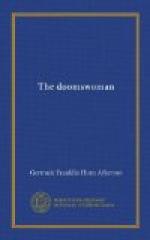“Diego,” I said, divided between despair and curiosity, “you have fancied many women: wherein does your feeling for Chonita differ? How can you be sure that this is love? What is your idea of love?”
He sat down and was silent for a moment, then spoke thoughtfully: “Love is not passion, for one may feel that for many women; not affection, for friendship demands that. Not even sympathy and comradeship; one can find either with men. Nor all, for I have felt all, yet something was lacking. Love is the mysterious turning of one heart to another with the promise of a magnetic harmony, a strange original delight, a deep satisfaction, a surety of permanence, which did either heart roam the world it never would find again. It is the knowledge that did the living body turn to corruption, the spirit within would still hold and sway the steel which had rushed unerringly to its magnet. It is the knowledge that weakness will only arouse tenderness, never disgust, as when the fancy reigns and the heart sleeps; that faults will clothe themselves in the individuality of the owner and become treasures to the loving mind that sees, but worships. It is the development of the highest form of selfishness, the passionate and abiding desire to sacrifice one’s self to the happiness of one beloved. Above all, it is the impossibility to cease to love, no matter what reason, or prudence, or jealousy, or disapproval, or terrible discoveries, may dictate. Let the mind sit on high and argue the soul’s mate out of doors, it will rebound, when all is said and done, like a rubber ball when the pressure of the finger is removed. As for Chonita she is the lost part of me.”
He left that day, and without seeing Chonita again. Valencia was in wildest delirium for a week; at the end of the second every hair on her head, her brows, and her eyelashes had fallen. She looked like a white mummy, a ghastly pitiful caricature of the beautiful woman whose arrows quivered in so many hearts. They rolled her in a blanket and took her home; and then I sought Chonita, who had barely left her room and never gone to Valencia’s. I told her that I had witnessed the curse, and described the result.
“Have you no remorse?” I asked.
“None.”
“You have ruined the beauty, the happiness, the fortune, of another woman.”
“I have done what I intended.”
“Do you realize that again you have raised a barrier between yourself and your religion? You do not look very repentant.”
“Revenge is sweeter than religion.”
Then in a burst of anger I confessed that I had told Estenega. For a moment I thought her terrible hatred was about to hurl its vengeance at me; but she only asked,—
“What did he say?”
Unwillingly, I repeated it, but word for word. And as I spoke, her face softened, the austerity left her features, an expression of passionate gratitude came into her eyes.




